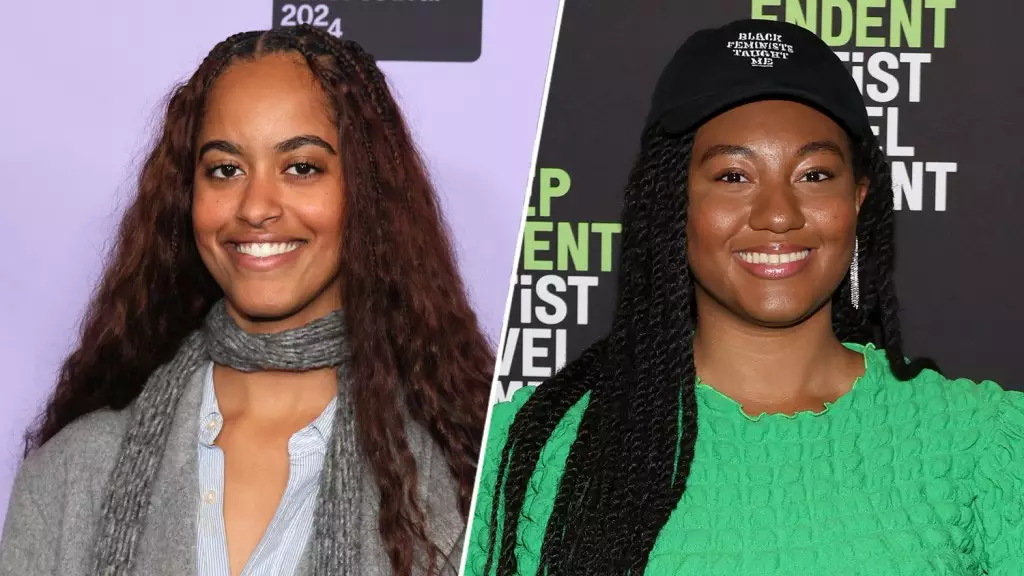The world of film is no stranger to controversy, but the recent allegations surrounding Malia Obama’s debut short film at the 2024 Sundance Film Festival have raised profound questions about originality and inspiration. The former first daughter’s short film, *The Heart*, is facing scrutiny for allegedly borrowing significant visual and thematic elements from Natalie Jasmine Harris’s earlier work, *Grace*. This situation exemplifies the ethical dilemmas that often plague the creative industries; should one’s prestige immunize their work against accusations of derivative creation?
Harris’s discontent is not merely limited to a bitter sense of rivalry; it is a clarion call signaling the broader systemic issues at play in the film industry. When she claimed to see “a lot of similarities” between her film and Obama’s Nike advertisement featuring WNBA star A’ja Wilson, she erected a mirror reflecting our industry’s troubling dynamics. It’s easy to dismiss such concerns as mere envy, but what if this time the accusations stem from something deeper—an industry-wide pattern that relentlessly sidelines emerging artists in favor of established figures?
The Cost of Celebrity
By virtue of her lineage, Malia Obama immediately garners attention and resources that many budding filmmakers can only dream of. This inherent privilege complicates the landscape of art and originality. When talent is shuffled aside for popular names, the film ecosystem suffers. Harris’s frustration echoes a sentiment that has long lingered in various creative circles: that established artists benefit from an unequal playing field fostered by industry favoritism.
It is a difficult scenario for Harris, who, despite her groundbreaking work, feels the weight of an unfathomable hierarchy resting upon her career. Her depiction of the Black Southern Gothic, an art form rich in history and storytelling, is a genre ripe for exploration and innovation. It is not just a matter of ‘who created what’ but also a profound concern for how many unique narratives go unheard when brands continuously lean towards star power over emerging genius.
Systemic Disregard for Independent Voices
Harris’s piece in Business Insider articulates a pressing dilemma faced by many in the independent film sector: the glaring absence of acknowledgment or support from larger entities like Nike. The idea that brands reach for directors like Obama, while sidelining independent filmmakers with unique, compelling stories, raises an urgent question—how can we cultivate diverse narratives if established names are continually funded over new talent?
Malia Obama has the right to explore her creative potential. Yet, as Harris aptly points out, why not hire her instead? This disconnection strengthens the narrative that Hollywood is failing its new voices. The pressure toward innovation stagnates when the industry reverts to its comfortable habits. The possible implications for aspiring filmmakers are sobering; if they don’t see avenues for success, how can the next generation be inspired to pursue their passions?
Voices of Dissent
Harris is already encountering resistance from those who decry her assertions as petty or insignificant. Detractors argue that claiming inspiration from universally known childhood games, like pat-a-cake, undermines her complaints. Yet, the essence of cinema lies not just in the stories told but in the visual languages and emotional nuances that are crafted. It’s curious that some individuals cannot discern the fine line between inspiration and appropriation. Questions of originality must be met with the understanding that every piece of art is influenced by myriad sources; however, this should not excuse creative monopolies and brand exploitation.
By expressing her frustrations, Harris is refusing to be silenced by the political correctness that clouds discussions around privilege, race, and artistic representation. The motivation to speak out is not simply about personal grievances but speaks to a larger ethos regarding the viability of independent art in an industry that, far too often, commodifies creativity for profits.
While the film industry is undoubtedly rife with complexities, the current moment calls for a critical examination of who gets to tell stories and who has the privilege to reimagine others’ narratives without consequence. Harris’s call for acknowledgment is a plea for change within an industry that must prioritize inclusivity and originality over the allure of fame. The dialogue ignited by her claims represents an opportunity for reflection—one that the industry can hardly afford to ignore.


Leave a Reply